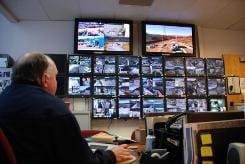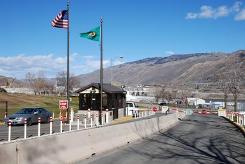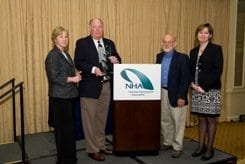Comprehensive Utility Security Program

Security Director Dick Robert can view all camera monitors from his office. The monitors were added as part of a security upgrade program that Chelan County PUD implemented after September 11.
Summary
With safety, security, and reliability issues more important than ever in the post-September 11 world, Chelan County Public Utility District (PUD) has pursued an extensive program of upgrades that improve facilities throughout its system. The effort includes a $3.8 million network that protects dams, transmission lines, distribution infrastructure, water/wastewater systems, fiber-optic lines, buildings, computers, and, most important, people.
Achievements include:
- A network of 80 video and thermal-imaging cameras to scan facilities day and night and feed a high-quality image-monitoring network.
- Cyber-security, badging and 24-hour guards to deter intruders.
- Collaboration with law enforcement that allows camera images to be shared in real-time with the regional emergency dispatch center and with other state and local government agencies.
- Self-sufficient maintenance, operations, and training that provides in-house expertise for continuous operating capability.
The District is recognized as a model for other utilities and has been asked to share its best practices with the Department of Homeland Security, the Federal Energy Regulatory Commission, the Western Electricity Coordinating Council, North American Electric Reliability Corporation, and others.

A guard station checks all who enter the Rocky Reach Hydro Project. The security upgrades have allowed a public visitor center and museum at Rocky Reach Dam to remain open.
Background
After 9/11, Chelan County PUD contracted with security expert Dick Robert, a former FBI agent, to advise the District on protecting critical infrastructure associated with three dams, a domestic water system, several small sewage systems, and a vital fiber-optics network that links all PUD facilities throughout 2,920-square-mile Chelan County, Washington.
Robert had to determine what steps would be required to protect approximately 700 employees along with $6 billion worth of physical assets including hydroelectric dams, switchyards, transmission lines, water reservoirs, pipes, office buildings, vehicles, and computer data. As a public utility that had always operated in a climate of openness and accessibility, implementing and communicating the changes created special challenges for the District.
Robert joined the staff full-time in August 2002 to create a new Security Department. National organizations dedicated to security and safety operations have recognized the work Robert and his team have done, and the District’s efforts have become a model for similar efforts around the country.

From left to right: NHA President Leslie Eden, former FBI Agent Dick Robert, Chelan County PUD Commissioner Werner Janssen, and Julie Smith-Galvin of Brookfield Power.
Challenge
Under repeated warnings about possible terrorist attacks on energy systems, Robert had to devise a plan that would protect facilities 60 miles apart, including power and communication lines that cover more than a thousand miles – much of it through deep back country forest.
Robert and his staff had to educate, convince, and train utility employees to carry ID badges, to log on to their computers repeatedly during the day, and to check in at guard posts when going to work sites. The team had to build guard stations, remodel building entrances, and install eighty security cameras.
A utility with the motto, “Owned by the people we serve,” faced a major culture and attitude change – and it had to explain to its “owners” why they could not go everywhere and see everything they could in the past.
The public also questioned the company’s request for several million dollars to install state-of-the-art protection systems. Utility employees also felt the fiscal impact as they watched funds that the District could have allocated for other programs go to security needs.
Innovation
Part of the Security Department’s key to success was building collaborative, supportive relationships with local law enforcement agencies. Robert knew they faced even more financial constraints than the PUD, so he arranged a series of mutually beneficial steps that served the needs of all. When the District installed and connected security cameras over high bandwidth fiber-optic cables, Robert made sure the cameras were also accessible by the local emergency centers known as RiverCom 911, the Washington State Patrol District 6 Dispatch, and the Chelan County Department of Emergency Management. Both the PUD security staff and dispatchers at these first-responder centers can control the cameras remotely.
Robert signed contracts with local law enforcement for security services (such as staffing an airport-style metal detector at the Rocky Reach Dam Visitor Center) so the PUD could avoid hiring dozens of new security staff. The PUD contracted with a local private security firm to provide guards who could staff entry gates at the dams and who could monitor visitor traffic at office entrances, which now used electronic badge readers.
Robert also trained PUD employees to operate and maintain proprietary systems, which ensures that the company can respond to emergencies even when vendors are far away.
Results
PUD facilities have suffered no major attacks nor damage since the District implemented these measures. PUD employees feel more secure because they know security personnel carefully monitor access by outsiders.
Anti-hacking computer systems and virus protection have blocked hundreds of thousands of attempts to penetrate PUD firewalls.
Guards on patrol have apprehended thieves and vandals in the act of damaging PUD structures and equipment. The camera system has also helped law enforcement monitor suspicious activity near the facilities, capturing images of situations as diverse as water-main breaks, suspects hiding from police, and even a prowling cougar.
The Visitor Center and Museum at Rocky Reach Dam has been able to remain open to the public because the Federal Energy Regulatory Commission is convinced the security measures in place at the dam are sufficient to protect the facilities and the public.
As a result of crisis management and emergency response training, PUD employees have also become Incident Command System (ICS) working partners with other local agencies during major fires and power outages and are prepared for all emergencies.
Stakeholder Quotes
“The PUD has acted to promote public trust and confidence in the District’s resiliency and recovery capabilities in a variety of ways, including, most notably, establishing partnerships to foster and facilitate activities and initiatives designed to improve critical infrastructure protection and homeland security in our community.
“The PUD has shared and analyzed threat and vulnerability information and has helped the public resist attacks and take preventive steps to address exposures in our community.
“Importantly, these efforts have established emergency response structures that are aligned with the decentralized nature of the nation’s homeland security. The District’s ability to respond to emergencies has been substantially strengthened due to these efforts.” — Mike Harum, Chelan County Sheriff
“Over the past several years, the CCPUD has cultivated a strong partnership with local public-safety agencies. This partnership is built upon a foundation of trust, respect and professional support. Through our collective efforts, we continue to enhance our state of emergency preparedness in this region. Examples:
“The CCPUD has provided video monitors to the WSP, which enables us to watch for safety/security incidents at numerous locations. In fact, this resource once allowed the WSP to successfully apprehend a suspect who was involved in a felony hit and run collision.
“In November of last year, the CCPUD invited the WSP to co-develop a full-scale “eco terrorism” exercise at Rocky Reach Dam. This exercise proved invaluable, as we gained a mutual understanding of capabilities, consequences and recommended alternatives.” — Captain William F. Larson, District 6 Commander, Washington State Patrol
“The invitation made by the Chelan County PUD to assist the US Government at their project site in establishing a sound and valid security risk assessment standard is also clear evidence that they are continuously pro-active in their pursuits of excellence in their security operations. The discussions and interactions I witnessed at the project site also convinced me that the stakeholders and the electric power user community are benefiting well from the highest level of protection for their investments.” — Rudolph V. Matalucci, President, PhD, P.E., Rudolph Matalucci Consultants, Inc.


